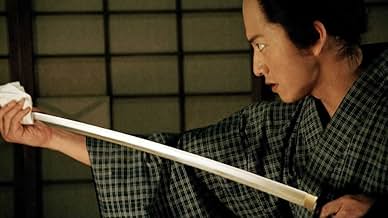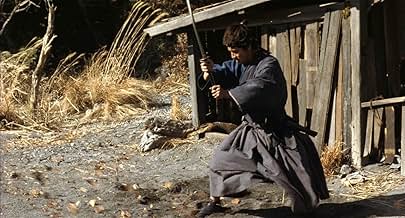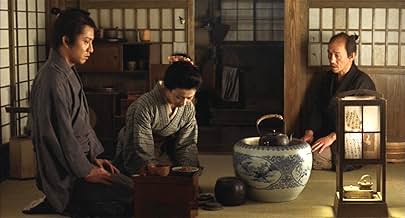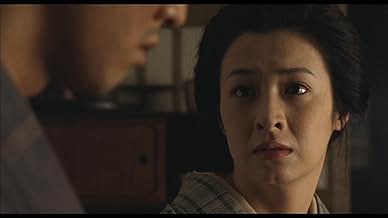IMDb रेटिंग
7.7/10
4.5 हज़ार
आपकी रेटिंग
अपनी भाषा में प्लॉट जोड़ेंA look at the relationship between a young blind samurai (Kimura) and his wife, who will make a sacrifice in order to defend her husband's honor.A look at the relationship between a young blind samurai (Kimura) and his wife, who will make a sacrifice in order to defend her husband's honor.A look at the relationship between a young blind samurai (Kimura) and his wife, who will make a sacrifice in order to defend her husband's honor.
- पुरस्कार
- 15 जीत और कुल 16 नामांकन
Z. Charles Bolton
- Man B
- (English version)
- (वॉइस)
Duncan Brannan
- Hori
- (English version)
- (वॉइस)
- …
Cole Brown
- Sensei
- (English version)
- (वॉइस)
Chris Burnett
- Shinsuke
- (English version)
- (वॉइस)
Colleen Clinkenbeard
- Kayo Mimura
- (English version)
- (वॉइस)
फ़ीचर्ड समीक्षाएं
This is a really good film. Slow paced, just like real life in the Edo jidai. A good story, excellent acting and it gives good insight to the daily life of a low level samurai. There's a great atmosphere with not flashy but realistic scenery.
If you are looking for lots of action and swordplay, this isn't for you. But I found this film strangely moving and quite beautifully arranged.
Well worth seeing.
If you are looking for lots of action and swordplay, this isn't for you. But I found this film strangely moving and quite beautifully arranged.
Well worth seeing.
A young samurai, married to a beautiful woman, accidentally becomes blind for life. This is the intimate story of what happens to this couple in mid-nineteenth-century Japan. Finding personal honor, love for oneself and for the woman one loves, finding a purpose for living. Director Yamada tells us this with an increasingly engaging and intimate narrative style. In my opinion very refined in the feelings it wants to convey, accurate in the scenic reconstructions of daily life of the time. Worth seeing if you liked, also by Yamada, Twilight of the Samurai (2002) even if it does not reach the depths of story, feelings and direction.
So this is suppose to be Yôji Yamada's final movie in this style of samurai trilogy, the previous two films being "The Twilight Samurai" and "The Hidden Blade". And this final installment is absorbing as the previous films to some degree but also lacks the entertainment value like the previous films as well. Although this trilogy is sort of dry in some aspects. This however has slightly more of a modern feel to it compared to the previous 2 films in this trilogy. But it's still a bit slow paced and dry at times, this trilogy isn't for everyone but it does have it's target audiences. The protagonist is played by Kimura Takuya which I was hesitant with, but he played his role pretty well. The progression of the story could have been paced a little quicker, but I can understand why it takes the slower route. But still the slow pacing really makes this movie dry and sort of dull at times. This movie is also very far from being action packed despite it having samurais, but what it does have is drama and emotions. And wanting to know what happens next kept me attached to this story, despite the pacing being so slow at times. If the pacing was slightly quicker the movie would have been better in my opinion and would keep majority of the audiences attention, so the main flaw in my opinion is the pacing. Overall it's a pretty good final in this trilogy although the story has nothing to do with each other besides the fact that it all revolves around samurais, it's worth at least a watch.
7.6/10
7.6/10
Both the setting of the theme and the creation of the emotional atmosphere tend to make the film more romantic. And exquisite detail guarantees the reliability that a drama about ancient Japan should have. Although the film mainly focuses on the daily life of a samurai, the director Yôji Yamada still gave a little bit of chivalric romance to the ending. However, there is no coexistence between the everyday life and the spirit of a samurai.
Therefore, the protagonist's choice finally writes a summary for this passing era.
A low-ranking samurai, jaded with his dull daily routine, finds himself tested to the core when his food-tasting assignment leaves him blind.
Yoji Yamada's project exploring samurai in transition expands, having had an outing in Twilight Samurai. That movie had Hiroyuki Sanada in the starring role, and the constantly under-achieving Takuya Kimura was always going to be a hard sell in this role for some. However, he stands up competently here. Shinnojo wakens blind and immediately becomes suicidal. He is granted a healthy stipend of rice from the authorities, and the slow dawning of its true price inexorably works on Shinnojo, eventually becoming too much to bear. This delicately paced transition is plotted by Kimura's expressions, from self-loathing to acceptance to vengeful warrior, with loving husband always present.
Kaori Momoi parades her usual quirky genius, but Rei Dan as loving, loyal wife Kayo is the stand-out performance here. Kayo's burden proves equal to her husband's, and Dan earns our sympathy as the compromised spouse.
The film doesn't quite achieve the delicacy and pathos of Twilight Samurai, but it does add another dimension to the humanistic portrayal of the samurai that is Yamada's trope. For that reason alone, Love and Honour is worth checking out.
Yoji Yamada's project exploring samurai in transition expands, having had an outing in Twilight Samurai. That movie had Hiroyuki Sanada in the starring role, and the constantly under-achieving Takuya Kimura was always going to be a hard sell in this role for some. However, he stands up competently here. Shinnojo wakens blind and immediately becomes suicidal. He is granted a healthy stipend of rice from the authorities, and the slow dawning of its true price inexorably works on Shinnojo, eventually becoming too much to bear. This delicately paced transition is plotted by Kimura's expressions, from self-loathing to acceptance to vengeful warrior, with loving husband always present.
Kaori Momoi parades her usual quirky genius, but Rei Dan as loving, loyal wife Kayo is the stand-out performance here. Kayo's burden proves equal to her husband's, and Dan earns our sympathy as the compromised spouse.
The film doesn't quite achieve the delicacy and pathos of Twilight Samurai, but it does add another dimension to the humanistic portrayal of the samurai that is Yamada's trope. For that reason alone, Love and Honour is worth checking out.
क्या आपको पता है
- ट्रिवियाIn the film it is mentioned repeatedly that the main character of Shinnojo Miura receives a yearly stipend of 30 koku. During the Edo period of Japan a koku was a unit of measure that had the equivalent of one year's worth of rice for a person (approx. 150 kg). For a samurai 30 koku was a small salary and Shinnojo was thus of a low level. Incidentally, the title character from another of Yôji Yamada's films Tasogare Seibei (2002) also receives a 30 koku stipend after having 20 koku deducted from his 50 koku salary to pay for his recently deceased wife's funeral.
- गूफ़It is not stated why, when blinded, he could not continue with his food tasting role, for which sight is not required.
- भाव
Shinnojo Mimura: Be resolved you will both die. In that lies victory. Life lies in resolve for death.
- कनेक्शनFollows Tasogare Seibei (2002)
टॉप पसंद
रेटिंग देने के लिए साइन-इन करें और वैयक्तिकृत सुझावों के लिए वॉचलिस्ट करें
- How long is Love and Honor?Alexa द्वारा संचालित
विवरण
बॉक्स ऑफ़िस
- US और कनाडा में सकल
- $60,910
- US और कनाडा में पहले सप्ताह में कुल कमाई
- $5,234
- 4 मई 2008
- दुनिया भर में सकल
- $3,37,55,574
- चलने की अवधि
- 2 घं 2 मि(122 min)
- रंग
- ध्वनि मिश्रण
- पक्ष अनुपात
- 1.85 : 1
इस पेज में योगदान दें
किसी बदलाव का सुझाव दें या अनुपलब्ध कॉन्टेंट जोड़ें














